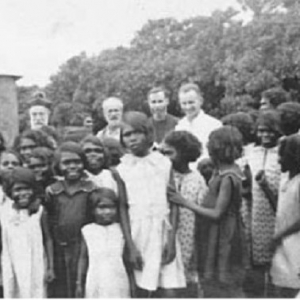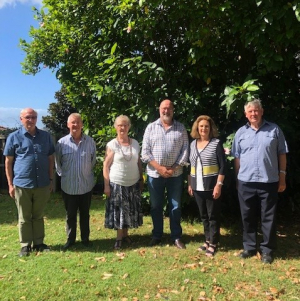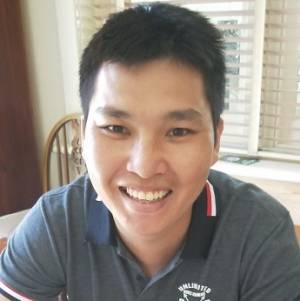Peter MALONE
80 Years – remembering John McGrath MSC, Bathurst Island, warning Darwin.
80 Years – remembering John McGrath MSC, Bathurst Island, warning Darwin.
And Ed Bennett MSC, Melville Island
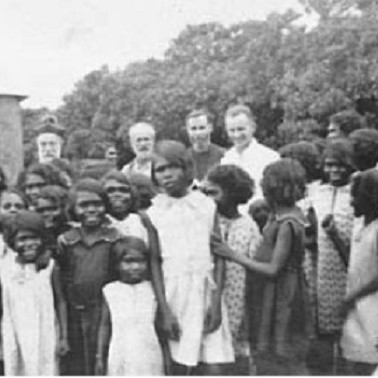
From John P McD Smith, ‘I Saw the Bombers’, Alice Springs News, February 22nd 2022.
Bathurst Island lies 50 miles north of Darwin and on that fateful morning Father John McGrath, the priest in charge of the Catholic mission on the island, was going about his daily duties.
Children were on their way to school. Mothers were cleaning their small houses and fathers were beginning work for the day.
Father McGrath’s attention was drawn to a loud moaning noise in the sky. He looked up to see a great number of aircraft in the north-west.
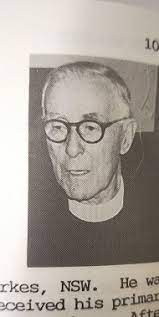
He became alarmed given the excessive number of aircraft. Being a coast-watcher he thought it prudent to radio Darwin so he went to the small radio shed and began transmitting at 9:35 AM.
His communication said: "I have an urgent message. An unusually large air formation bearing down on us from the north-west. Identity suspect. Visibility not clear."
The Japanese aircraft picked up his message and suspected it was a warning to Darwin. Three aircraft peeled away from the formation, flew low over the island and opened fire with their machine guns.
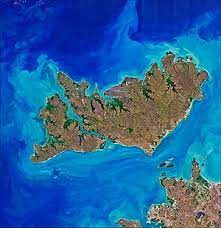
Bullets struck all around the shed where Father McGrath was transmitting and. And tore holes in the adjacent wall; but the priest, at risk to his own life, kept sending his message.
If Fr McGrath's warning had been properly heeded then the authorities would have had 20 precious minutes to prepare and perhaps fewer people would have died.
That might have been enough time to get most of the RAAF for aircraft into the air. Messaging under enemy fire was an incredibly brave act for which Fr McGrath has never received any formal recognition or honour.
_____________________________________________
The first notice of the Japanese attack received by the hapless citizens of Darwin was the terrifying sound of falling bombs. Within two hours of the first attack, Japanese aircraft struck Darwin again. Owing to the lack of response to Father McGrath's warning, heavy damage was inflicted on the town, shipping in the harbour, and the RAAF airfield in the two initial air raids on 19 February.
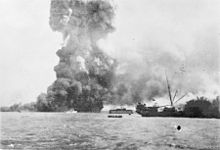
Eight ships were sunk in the harbour and many were damaged. A Japanese dive bomber attacked and severely damaged the clearly marked hospital ship Manunda. Stoker 2nd Class Charlie Unmack was aboard the minesweeper HMAS Gunbar in Darwin harbour and provides an eyewitness account of the first air raid.
____________________________________________
Br Ed Bennett’s story from Melville Island

Br Ed Bennett first went to Alice Springs in 1936 and helped set up the Charles Creek Mission. He then went to Melville Island and set up the Mission at Garden Point.
It was there in 1942 that he saw the Japanese planes passing over on their way to bomb Darwin, but his warning to the Government radio relay on the island was ignored.
On February 19 1942 the first wave of Japanese aircraft flew overhead on their way to bomb Darwin. "I could see the heads of the pilots, they were so low," Br Bennett remembered.
Br Bennett later told historians that he was with the resident coast watcher, John Gribble. Br Bennett said that he urged Gribble to send a warning. Gribble refused to do so, saying the message would have to be sent in code, and he did not have the necessary code books.
Despite Br Bennett's urging, no message was sent, the Darwin city website says.
Martin Daubney, Chancellor of Australian Catholic University.
Martin Daubney, Chancellor of Australian Catholic University.
The Honourable Martin Daubney AM was installed as Australian Catholic University's fifth Chancellor at an installation mass at St Stephen's Cathedral in Brisbane on Friday 11 February.
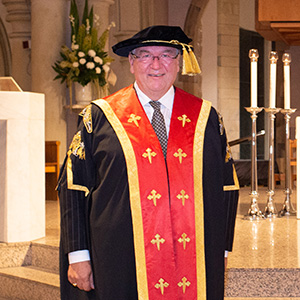
Martin Daubney was a student at Downlands College in the 1970s, spent two pre-novitiate years at Sacred Heart Monastery, Croydon, and them embarked on studies that led to his distinguished legal career.
Archbishop Mark Coleridge, president of ACU Corporation, president of the Australian Catholic Bishops Conference and Brisbane Archbishop, was the principal celebrant and delivered the homily.
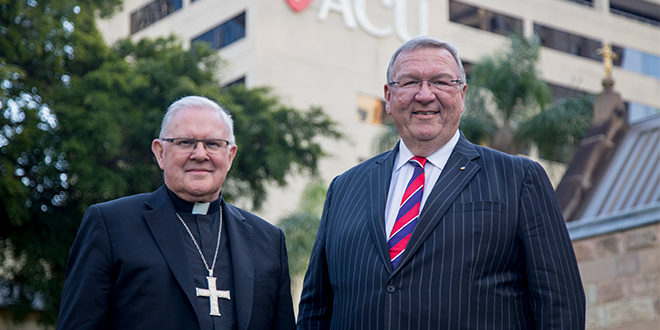
Members of the Daubney family, representatives of ACU’s founding orders, members of the Church and clergy, former ACU chancellors and vice-chancellors, former and present ACU staff and students, ambassadors, members of federal and state government, vice-chancellors and higher education colleagues, industry partners, and members of the Queensland judiciary were among those who attended the Mass of celebration.
Mr Daubney pledged an “unequivocal affirmation of the Catholic intellectual tradition which informs our academic pursuits, the fundamental Christian conceptions of truth and love which shape our actions and aspirations, and the essentially Catholic mission to which we are committed at ACU”.
In an address to the congregation, Mr Daubney outlined such commitments to the mission as “practical and ethical groundings for all we do and all to which we aspire at ACU”.
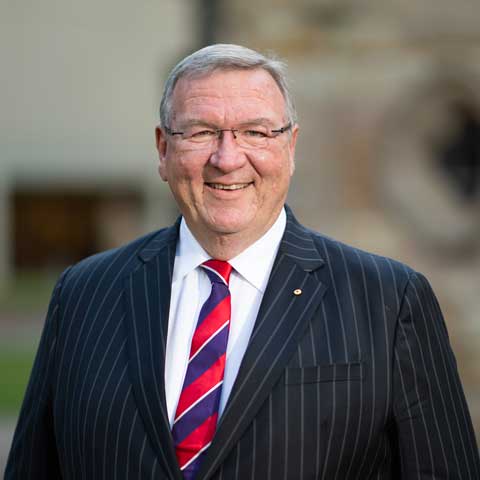
“They provide essential paradigms within which our students may deploy their learnings. They inform our approach to research and provide a principled foundation for our academic culture. In short, our mission is at the heart of everything we do and define our vocation as an Australian Catholic university.”
Prime Time
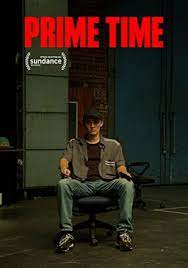
PRIME TIME
Poland, 2021, 93 minutes, Colour.
Bartosz Bielenia, Magdalena Poplawska, Andrzej Klak.
Directed by Jakub Piatek.
A Polish drama of 2021 which has evoked memories of Sidney Lumet’s Network and the protest at the television station dramatised by the eccentricities of Peter Finch’s character and his declaration that they were not going to take it any more.
This time it is New Year’s Eve, 1999-2000, entertainment programs, competitions, drawing of winners, the host of the evening rather glamorous, working with the production team, though with some tensions.
But, the main part of the action concerns a young man, seen outside the television station, getting in, producing a gun, taking the host and one of the security men as hostages. In the background are various news items indicating political unrest in the country and the role of politicians, especially as they make speeches for the New Year.
On the one hand, there is the physical drama in danger of the hostages and the young man with the gun. On the other hand, there is the psychological conflict, the upset of the host, sometimes strong, sometimes highly upset. And, there is the management. And the police are called in, attempts to negotiate with the hostage taker.
There is always tension in the dramatising of the situations, some expected action, some unexpected turns. And, the end of the film is not quite anticipated – more civilised than might be expected than an American action-packed version of such a situation.
While the setting is the Eve of 2000, it has been remarked that 20 years later, the protest on the young man would have been done on social media, with a wider platform, than taking hostages at a television station so that he could proclaim his protest.
- The title? The media? Television? Audiences? Prestige?
- The setting, New Year’s Eve, television, the competition, the celebrity? The background of the production, the workers? The hostage situation? The management? The police and assault force? The musical score?
- The focus on Mira, late, celebrity, the stand-in being ejected, Laura and managing the program, the competition, the contact with the winner, his being on the phone even after the crisis opened? The producers?
- Sebastian, the audience seeing him outside, coming in, intruding, the gun, the security guard, the confrontation with Mira? The situation, New Year’s Eve, his wanting to contribute a message, his being disturbed, ringing his father?
- The hostage situation, Sebastian, his age, with the gun, ousting the floor staff, the use of the camera, Mira knowing how to use the camera, emptying the production box? The threats, treatment of the security guard, of Mira? His being quiet? Her upset, the touch of tantrums, wanting to ring her daughter?
- The arrival of the police, the negotiator, his techniques, the conversations, the impatience of the police commander, intruding, Lena and her place as second in charge? Laura and the other members of the staff? The tactics of delay, the need to call the company chief? His eventually arriving? Lena taking over the negotiations, the tactics, exasperations?
- Time passing, Sebastian, patience and impatience? Treatment of the couple, touches of violence, the threats, in the chairs, moving the car, working the camera?
- The police bringing in his father, the conversations, the absent mother, the tensions between father and son, the to-ing and fro-ing, attacks and criticisms? Withdrawing the father?
- The prepared speech, the Prime Minister, reassuring the nation? The background of all the television programs for New Year’s Eve, celebrations, interviews, uprisings and violence? Poland on the eve of the 21st-century? The millennium fears about computers…?
- The manager, finally agreeing? The bag, the fear of a bomb, the evacuation of the building, going next door, setting up communications again?
- The promise to Sebastian, the slot after the Prime Minister, the setting up of the camera, Mira and her advice? The plans, the details?
- The lights going out, Mira and her injuries, Sebastian allowing her to go out, the medico? The security guard carrying Mira out, his returning, the conversation, his being allowed to go?
- Sebastian, his speech, burning it, the attack, on the floor, the guards, brutal treatment? The rest, in the van?
- The focus on the hostage situation, how it was handled, rather than the details of the message?
Plagues of Breslau
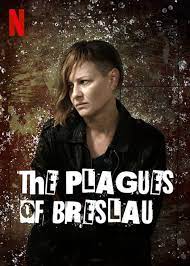
PLAGUES OF BRESLAU
Poland, 2018, 93 minutes, Colour.
Malgorzata Kozuchowska, Daria Wizawska.
Directed by Patryk Vega.
A Polish drama, a police investigation, quite tough in its presentation of the crimes as well as the investigation itself. At the centre is an experienced policewoman, brought up on a farm, able to recognise clues given at the time of the murders, her single-mindedness in her work. Later, there will be another investigator, also tough, who is a profiler.
The screenplay explains an event in the history of the city of Breslay (which is filmed beautifully, many vistas of the city itself, within the city itself, making it look an attractive tourist destination).
In the previous century, a ruler to consolidate his rule, executes a number of criminals, one a day, over a week, for significant crimes against society. In the present scenario, killings begin, noted that they take place at 6 PM in the evening, echo the historical precedent. Each day the victim is killed, an investigation as to who the victim was, the police and the audience learning that each of the victims was cruel, or a swindler, fraud… And so the days continue.
The presentation of the crimes, the executions, is very grim – and the crime branded on some part of their body.
It is interesting to follow the unravelling of the crimes, the interconnections, the dramatic buildup to try to prevent final crimes, including a top official at a Speedway event.
There are several twists in the investigation, some quite unexpected – and a rather grim postscript to these events in the behaviour of the investigating policewoman.
- The title? Evocative? The information about the city’s past history, the conquering of the city, the executions of offenders, restoring order? This background for the 21st-century situation, fence, justice, revenge? The particular offenses singled out – and the branding on the victims?
- The city of Breslau, the range of vistas, the beauty of the city, the river, the details of the city, the streets, the racecourse, theatre, police precincts? Authentic feel?
- The focus on Helena, sitting in the car, the intruders, her gun, seeing the drunken man, her grief? Later filling in the background, her fiance, the wedding plans, the alcoholic man, the accident and her fiance’s death? Her being tough, motivation?
- Helena and her investigations, the farm background, recognising the hide of the bull, later with the racehorses? Her tough stances, police work, with other members of the staff, with the district attorney and his love of being on the television, taking other people’s theories and promoting them? Her clash with the television journalist?
- The first killing, gruesome, the method, in the hide? Helena taking over, those assisting her, the crime scene, the autopsy and the doctor and her advice? The branding? Finding out his background by going to the farm, selling of the bulls, going to the abattoir, the interviews with the workers, the young woman upset and angry, the truth about the victim and his cruelty?
- The second killing, the explosion, the horses rampaging through the city, traffic and crashes, Helena and her pursuit, knowledge of noise and racehorses, taming the horse? The other horse, trampling Helena’s assistant? His going to the hospital, brain dead, Iwona and her that, her story, massaging him, the wife and child? Urging communication in care?
- The next victim, the methods, the branding, the opera, the singers, the fire, extinction of the fire? The executioner been glimpsed? The identifying of the victims, their background, oppression?
- In the precinct, the discussions, the explosion and the descending wheel, the victim with the broken bones, identification in the police force?
- The message from Warsaw, the expert coming, Iwona, local resentments and suspicions, her arrival, dress, manner, big and burly? Her taking command, analysing crime scenes, hypotheses, her expertise? The relationship with Helena, their working together, against the television journalist and her tough tactics with her, the district attorney and interviews? Conversations, eating together?
- The killings at 6 o’clock, and the sense of tension, anticipation?
- The plan for the Prime Minister, the racing car rally, the discussion with home security, Helena and her encounter with Iwona, two hours, her recovering? Going to the rally? The speech, the gift of the Prime Minister, the helmet, trying it on, discovering the head, carried out?
- And the explanation of the helmet, Helena and the two hours, the conversations with Magda, the explanations, the computer stick, the information, Magda and her having followed Helena, knowing her methods, knowing her experience, the dead fiance, capacity for killing? Magda and the guillotine, Helena and the head, taking it into the Speedway?
- Going to visit Magda’s family, the mother listing all her activities, losing jobs, the injustices, the final eviction from the house? Helena watching the eviction, Magda and her having organised the life insurance policy?
- The twist with Helena, stalking the alcoholic man, going into his house, confronting him? And the end of the story, in the open ending of what Helena would do and the consequences?
MSC Education and Chevalier Institute
MSC Education and Chevalier Institute

The Australian Province has had a strong history in Catholic education. 2021 saw the 90th anniversary of Downlands, 75th anniversary of Chevalier. This years is the 60th anniversary of Daramalan. Monivae will be 70 in two years time.
- Monivae College School Board had a Retreat Day facilitated by Anne McAtomney (Chevalier Institute) with Mark McGinnity present as the Director of MSC Education.

- The next two days, the Education Members Council had a retreat, again facilitated by Anne, ahead of their first meeting for the year.

- [Mark then travels to Downlands for their Ethos Committee and Board meetings.]
- Other members of the Education Council:

Anne Benjamin

Barry Smith MSC

John Mulrooney MSC

Phil Fitzgerald

Rita Daniels
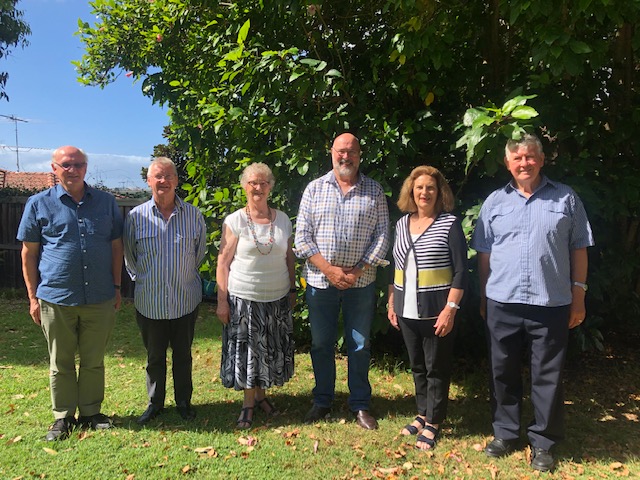
Welcome to Australia, Hua MSC/ Hoa Tran
Welcome to Australia, Hua MSC/ Hoa Tran
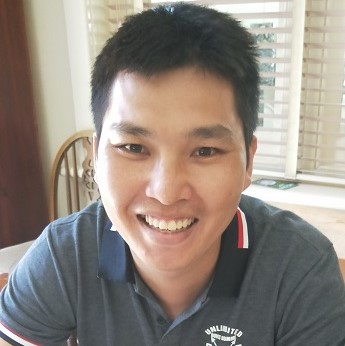
Hua has arrived from Vietnam to take up his theology studies at the Yarra Theological Union.
Next week Hua will turn 30. He became an aspirant in 2010, made his novitiate in the Philippines, first vows in 2018. He took time off at the end of 2018, teaching English (and doing units for a major in the evening on Teaching English).

He returned to the congregation in 2021, renewing his vows at Treand House last month.
He becomes part of the Blackburn community at Cuskelly House - which won't be as bright as the beach which he visited with Daniel when he arrived in Sydney!
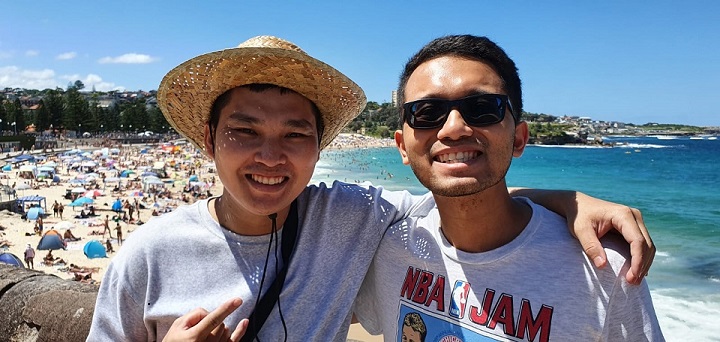
Aline
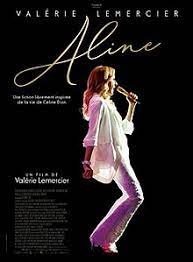
ALINE
Canada, 2020, 126 minutes. Colour.
Valerie Lemercier, Sylvian Marcel, Roc Lafortune, Danielle Fichaud, Antoine Vezine, Jean-Noel Broute. Voice of Vistoria Sio.
Aline Dieu. See and hear Celine Dion.
Why the change of name? One thought would be that an audience for a documentary on Celine Dion might be limited in its appeal. Rather, a fictionalised account of her life and career would draw on a wider audience, her fans, those who know of her, those who like storytelling rather than documentation. However, a documentary would include quite an amount of footage of Celine Dion singing. Not that there are not songs and singing in this story.
An assurance for those who expect to hear “My heart will go on…”. It does appear – in a re-enactment of her singing the song at the Oscars when Titanic won Best Picture.
French-Canadian actress, Valerie Lemercier, must be Celine Dion’s biggest fan, number one fan. Not only has she written the screenplay and directed, she appears as the singer (and with some strange special effects, even as the singer age 12 –, at the time of making the film, Valerie Lemercier was 55).
What we have here is a straightforward story of a singer, life within her very large family, family bonds, an ambitious mother, a genial supportive father, her being brought to the attention of entrepreneur, Guy-Claude Kamar when she was 12. And, as they say, and they say it often, and here we say it, the rest is history!
The Dieu family is very large, 14 children. But, Aline has a singing talent and the family is not afraid of pushing her forward. And Aline is not afraid of being pushed. So, the early part of the film shows her as something of a child prodigy, making her impact on television, then in concerts, an ever-growing public following.
There are some emotional complications when she falls in love – or, rather, a gradual deepening of her love for Guy, considered far too old for her. And her mother, always interfering to protect her daughter as well as promote her, disapproves. But, Aileen has a strong personality and wants to make decisions for her own life, marrying Guy. He is continually present, managing her, urging her on, loving her.
Aline learns English, gains an audience in the English-speaking world as well is the French speaking world. She has some difficulties, not allowed to speak let alone sing for three months, not endangering her vocal chords. She wants to become pregnant, eventually does, the couple having the son on whom she dotes. Then, seemingly unexpectedly, pregnant again, and twins. There are some family dynamics, the son with his moments of jealousy towards the twins… But having the delight of his first concert seeing his mother perform on stage.
The action moves rather rapidly in the latter part of the film, months flying by, then some years, especially as the children grow up, Aline continues her singing. There are some griefs, her mother’s illness, but recovery, eventually her father’s death and, ultimately, the death of her husband after 21 years of marriage.
The final song of the film is worth listening to, a recapitulation in its lyrics of her own life, ups and downs, career, family, love, and ordinary woman, she sings, whose appeal is basically for her public. (And, to note, the voice of the songs is not that of Celine Dion but dubbed by Victoria Sio.)
- Audience interest in Celine Dion? Her life? Her career? Her talent?
- The decision to do a fictional biography, change the name of the family? Not to do a documentary? To keep the outline of Celine Dion’s life and career? How effective?
- The work of the director, her writing the screenplay, performing the role, the special effects for Aline at 12? The dubbed singing?
- A fairly straightforward biography? The background of the family in Canada, the grandparents, way of life, the farm, Aline’s father, marrying her mother? The large family, Aline’s place? The spirit of the family and sharing, the cramped house and rooms, meals…?
- Aline and her talent, singing, making the tape, her brother promoting her, sending the tape, no answer, the phone call, the visit, Guy and his listening, impressed?
- Aline at a young age, the training, the tapes, albums, concerts, television appearances? With celebrities? Her response to the public?
- The outline of her career, Guy and his managing, her relying on him, dependence, love, his character, divorces, managing Aline, always present, the best for her? Aline in love, wanting to marry, her mother’s strong reaction? The persevering, the wedding?
- The details of the career, the various concerts, the public reaction, the crowds, a range of songs, learning English, the English-speaking audience? National tours, to New York, to Paris and Europe? Singing at the Oscars, Titanic?
- Pregnant, the effect on her, the birth, her son, doting on him? The screenplay moving rapidly, over the months, the years, his growing up, at his mother’s first concert?
- Aline pregnant again, her son’s reaction? The birth of the twins? The screenplay moving quickly, the months, years, the twins growing up? Aline as mother, the touch of jealousy with her son? The three waiting at the window to see her come home?
- Aline with her staff, at home looking after the children, the make up artist, Fred, sacked, his work with Aline, the dress for the Oscars, her employing in, his becoming a confidante?
- Illness in the family, her mother, recovering? The quiet father, always supportive? His death? Guy, illness, his death, 21 years of marriage?
- The effect of the final song, its lyrics, summarising her life in perspective, an ordinary woman, singing for the public?
Marry Me
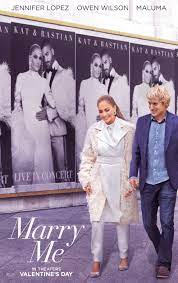
MARRY ME
US, 2022, 112 minutes, Colour.
Jennifer Lopez, Owen Wilson, Sarah Silverman, Maluma, John Bradley, Chloe Coleman.
Directed by Kat Coiro.
“A guilty pleasure!”. Not exactly the expected opening for a review of this romantic comedy. For fans of Jennifer Lopez, definitely a pleasure, not a scary guilt. For those who are not Jennifer Lopez fans, yes, probably a guilty pleasure.
“An insane response to a manic situation.” Well, that is what one of the characters states early on in the film – and, just saying it out loud, it does seem manic, preposterous. Here is a top American singer, on television, 20 million viewers, about to be married on screen, singing a duet with her partner, and suddenly discovering while on stage that he has been unfaithful to her.
Stop the marriage! And, the most manic moment is Kate Vogel, Jennifer Lopez’s character, surveying the audience, seeing an innocuous non-fan in the spotlight, holding a placard given to him by his daughter with big letters of the name of the song, Marry Me. She chooses him for an instant ceremony. And it happens!
At this stage, non-fans of Jennifer Lopez (and probably a big percentage of critics) are squirming in their seats. What could possibly happen?
In fact, what happens is a variation on the romantic comedy, although, to be fair, the audience knew the background of her choice when she didn’t, Owen Wilson playing Charlie Gilbert, divorced, having time with his 12-year-old daughter, Lou (Chloe Coleman), a very nice man who teaches maths in a creative way at school. And, he has a most boisterous friend, Parker, Sarah Silverman doing a lively Sarah Silverman! It is she who dragged Charlie to Kate Vogel’s concert/marriage.
Jennifer Lopez wrote nine new songs for this film and there are some lavish stagings as well as very quiet ones, (and that opening number is a highlight of showbiz kitsch).
We can’t help liking Charlie, who was quite bemused by the whole shenanigans, especially by his kindness in just helping out. And one of the main questions, of course, is how he is going to survive all the media hype. One of the interesting things about the screenplay is that there are quite a number of lines, situations, critically sending up the media, the stars entourage, the paparazzi and the everlasting cameras, (with Parker at one stage firing an extinguisher contents at the pursuing pack).
Yes, this is the story of the mellowing of the superstar, her having to face a few realities at school, for instance, rather than in her luxury jet. She has to become practical. And, she has to weigh up promoting her Grammy nomination with the reality of the relationship. And Charlie, charmed, fascinated, gradually falling in love, has to make decisions about Kate, Lou, and his students who are competing in the state Mathathon (with Lou as one of his stars but suffering from nervousness).
Realistic? Of course not, the film doesn’t claim to be. But, a dose of realism in the lives of these characters? Certainly!
A guess would be that at the end, not on stage but at the Mathathon, there’s probably a tear or two and sniffle around the cinema. Guilty!
- Title? Straightforward? Marriage and the variation on the theme, the wedding on television, 20 million viewers? The song, singing it on television before the wedding? Charlie and the placard?
- An insane response to a manic situation? The observation about the situation on television and the wedding? Plausibility? Audiences suspending disbelief?
- The world of the media, television stations and studios, sets, performance? Costumes and decor? Managers, dresses, affluence, private jets…? The paparazzi, photos, magazine articles, social media? Some of this film’s dialogue critical of the media and hype?
- The introduction to Kate, celebrity, Jennifer Lopez? Bastian, his singing, fiance, preparations for the wedding on stage? The song, performance, the kitsch background dancers and costumes? The information about his infidelity, video, social media? Finding out, her reaction? Banishing Bastian? Look around the audience, seeing Charlie and the placard, summoning him, the official, her marriage to “Somebody”? The aftermath, her reaction, Charlie’s reaction, trying to help out? Going home?
- Audience knowledge of Charlie, Owen Wilson’s presence in style, his ex-wife, his times with his daughter, 12-year-old, teaching maths, his style and skills with the students? Parker as his friend, her boisterous personality, wisecracks, intervening, taking him to the concert?
- The repercussions for the wedding? On Kate, continuing with her career, keeping up the facade for some time, the media? Interviews? Her meetings with Charlie, with Lou? Learning more about him? The repercussions for Charlie, seeing him in the classroom, the preparations for the Mathathon, Lou and her participation? Staff at school? Parker and her interventions?
- The discussions between Charlie and Kate, the outings, her manager and the discussions, her assistant, the preoccupation with her career?
- The more personal sequences, the effect on Charlie, at home, with Lou, at school? But seeing more, going to the recording session? His trying to teach her to be practical, to go out of her world, to discover more? The effect on her? Their time together, the sexual encounter?
- The possibilities for the relationship, the news about the Grammy nomination, her never having had a nomination? Her decision? The performance with Bastian, the media and the response of their being back together? Her stern stance?
- The background of her life, the jet, comfort? Her realisation about love, trying to get the plane ticket, Parker meeting her, $1000 for the van, the Mathathon, Lou and her nervousness, the tactics of the opposing team, coughing and spurning? Kate arriving, the happy reunion all round? The touch of tears?
- The film and its dramatising of the nature of true love, falling in love, the practical consequences of love?
Magic/ Chesterton
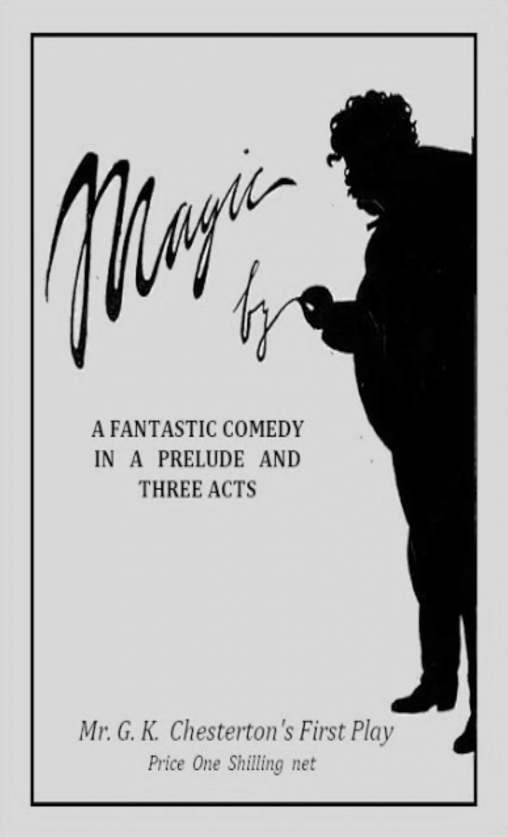
MAGIC
Australia, 2021, 70 minutes, Colour.
Vincent Parfitt, Barnaby Goodwin, James Domeyko, David Lucas, Kirsty McKenzie, Aaron J.March, Nick Barker-Pendree, Joe Loria.
Directed by Elvis Joseph.
‘magic’ (lowercase) is not a word or idea that springs immediately to mind when thinking of GK Chesterton. ‘Magic’(upper case), however, is the title of the play produced in 1913 (when he was 39). But Chesterton did like a mystery – witness Father Brown solving his cases but probing the clashes between good and evil.
Magic has now been turned into a 70 minute film by Elvis Joseph (assisted by Heather Joseph as producer and, judging from the credits, members of the Joseph family).
There is always a challenge of how to stage dramas set in the past: preserve their original atmosphere or modernise the situation while retaining the dialogue. The Magic-makers have opted for the former. We experience something of what Chesterton presented in his time (although there is a reference to 1913 as being modern times as well is a reminder that good manners are always in order).
Which means that like so many of the plays of the period (and the first three decades of the 20th century), the main setting is the drawing room of a country estate, complete with the Duke, his agent and glimpses of servants, his doctor and the local vicar (Chesterton was Anglican High Church before his conversion to Catholicism). There are two characters, brother and sister, lately coming from the US, representing the younger generation. And there is a visitor, invited by the Duke, a Conjuror.
As anticipated by any Chesterton devotee, the emphasis will be on dialogue, the words, intonations, pauses… Which means that this Chesterton devotee needs to be a listener, an attentive listener. Chesterton was a philosopher and theologian so this is not going to be just smart and witty dialogue and, because the makers of opted to stay with so much indoor action, though sometimes out in the street obsessed with a lamp that changes colour, magically, the film does resemble a staged play, stage performances, but editing enabling the audience to shift focus of attention from one character to another, often quickly, compelling us to notice and to be watchers as well as listeners, attentive to body language and facial expressions.
But, of course, with Chesterton, he challenges not only by what the characters are saying but by what they mean.
QED is not what we expect at the end of a Chesterton article or book (except Father Brown’s crime solutions). Chesterton does not solve. He probes.
The screenplay uses the device of a narrator – but here it is the writer of the story, busy at his typewriter (1930s look) but then out and about in the evening, walking, thinking, pondering.
And then we have the Conjurer, meeting Patricia in the garden, talking about fairies and magic but also introducing the theme of how much we should believe in ourselves. This makes us check where we stand. And this is immediately confirmed, schematically, by the appearance of the rationalist, the doctor, on the one hand and on the other the man of faith, Mr Smith the vicar (though Chesterton does not give him much faith-filled dialogue).
Since the Duke has invited the conjurer (and the Duke is self-satisfyingly comfortable on both sides of a cause and argument) to demonstrate magic, this leads to some emotional drama with the young man, Morris, modern and sceptical and a scorner, who becomes obsessed with one of the tricks, concerning the changing colours of the streetlamp. He rants, hyperventilates, and it drives him mad, literally. Conjurer give him a solution, the truth or a lie?
So, we are in the world of Chesterton Paradox. Is life reasonable? Is making sense of it reasonable? But is life able to be reasonable about? Probing life and its meaning without drawing up a set of rationalist principles? And the Conjurer reminds us that we have our demons. We have our spirits. Who are they? What are they? Do they control us?
Perhaps the best response to Magic (unless you watch it with the Pause button and take time off to thinks scenes through) is to let the dialogue wash over us, letting it seep into our consciousness, influencing our understanding – a 70 minute contribution by the Chesterton intelligence to what human existence is.
Here Out West
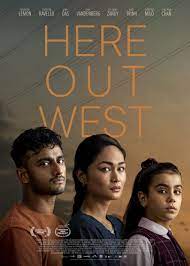
HERE OUT WEST
Australia, 2022, 106 minutes, Colour.
Genevieve Lemon, Gabriel Chan, Lena Cruise, Arka Das, Jing Xua Chan, Christine Milo, Christian Ravello, Jaime Ureta, Khoi Trinh, Leah Vandenberg..
Directed by Lucy Gaffey, Ana Kokkinos, Leah Purcell, Julie CalceffL Seth, Fadia Abboud.
The west of the title is the western suburbs of Sydney. But, the stories and characters could equally appear in a film about the western suburbs of Melbourne. Or in so many of the different areas of Australia’s capital cities.
We have a mixture of characters and stories, especially from different ethnic backgrounds, from the Middle East and from Asia, the subcontinent, south-east Asia, whose stories interconnect, centred on a major hospital in the western suburbs.
Each character and story is indicated with a heading. The first is quite striking, Genevieve Lemon as a grandmother visiting her daughter who has just given birth in the hospital and, with a grandmotherly impulse, snatches the baby, accompanied by a little Lebanese girl whom she is minding, and drives away. We see them at various stages as we follow other stories.
One of the strongest stories focuses on some Bengalis and an African friend, some disputes amongst themselves, one of them injured and going to hospital, cared for by a sympathetic Filipino nurse who is also crucial to the baby kidnapping story. And clashes with a severe white nurse, sometimes intolerant and hurtful. The young man is also drawn into another story, an elderly man dying in hospital, his daughter not understanding him as he speaks in Bengali as he dies. The young man serves as a translator – and there is some pathos as the daughter, who had been a singer working overseas, is able to sing a local Indian song as her father dies.
So, already we have a feel for Sydney’s western suburbs, enhanced by all kinds of views of the suburbs, from the overlapping freeways to the ordinary streets.
Towards the end of the film, the Vietnam theme is introduced, a young man, ambitious, calling himself Tom instead of Tuan, challenged by his family and his rather rebellious younger brother to face his origins as he tries to make a success of himself in local business. And, a strong focus on the Chinese, a dominant mother, her proud running of a restaurant which is about to close, the dilemma of the daughter and her boyfriend and moving interstate or the challenge of family and cultural loyalties demanding that she should stay.
This composite film was written and directed by five directors, all of them women, the more prominent, Ana Kokkinos, successful Dir of film and television for 30 years, and Leah Purcell (actor and director of The Drover’s Wife).
At just over 100 minutes, this is an interesting and entertaining introduction to life in the western suburbs, the range of characters, the range of ethnic backgrounds and languages, and each of them finding their place in multicultural Australia.
- The western suburbs of Sydney? Ethnic backgrounds? The same for Melbourne and other cities?
- The collaboration of the range of writers and directors, female perspectives? Characters?
- The visualisation of the suburbs, the busy freeways, the quiet streets, homes, industry, restaurants? And the focus on the hospital, exteriors, interiors, surgery, the floors, the various rooms? The musical score?
- The screenplay, the introduction to Nancy and the snatching of the baby, the little girl with her, the car, seeing her throughout the film, the hit run, being helped, the dilemma about returning the baby, alienation from her daughter? Returning to the hospital at the end?
- The Hispanic man, age, his work, love for football, pressure and his son, at home, the matches, his son not turning up, the confrontation between the two? Discovering his father’s poetry?
- The young men, rivalries and friendship, subcontinent backgrounds, African backgrounds? The girlfriend, the breakup, the truth? The focus on Robbie, the hit run and Nancy passing in the car? Fights, Robbie injured, going to the hospital, his mother phoning, to bring home condensed milk? The nurse asking him to come to the dying Bengali man, his daughter, her character, singer, overseas travels, her father wanting to die in India, her lack of expertise in the language, Robbie doing the translation, his daughter singing in Ben Corley?
- The Vietnam story, the two brothers, in the car, Tom, success in business, phone calls? His brother, rebel? Going home, the parents? Tom asserting himself, listening to the family – and calling himself Tuan?
- The Chinese story, the strong-minded mother, going to the countryside, wanting to move out, her daughter, her daughter’s boyfriend, considering moving interstate? The closing night of the restaurant? The guests, the daughter out on the street, the singers in the karaoke, the singer and his bond with the mother? The daughter, discovering Nancy and the child, hospitality, her decision to stay?
- Kurdish musician, refugee, his wife, family, settling, difficulties of language, making the instruments, his wife making the carpets? The couple arriving, language difficulties, the offer of the job, cleaning bricks, more money? Ultimately, the musician taking the job?
- The Filipino nurse, work at the hospital, is seen Nancy with the baby, the severe nurse and her reprimands (and her bigotry towards the Bengalis)? Taking extra shifts? Life at home? Bringing her husband and child in the Philippines? The loneliness?
